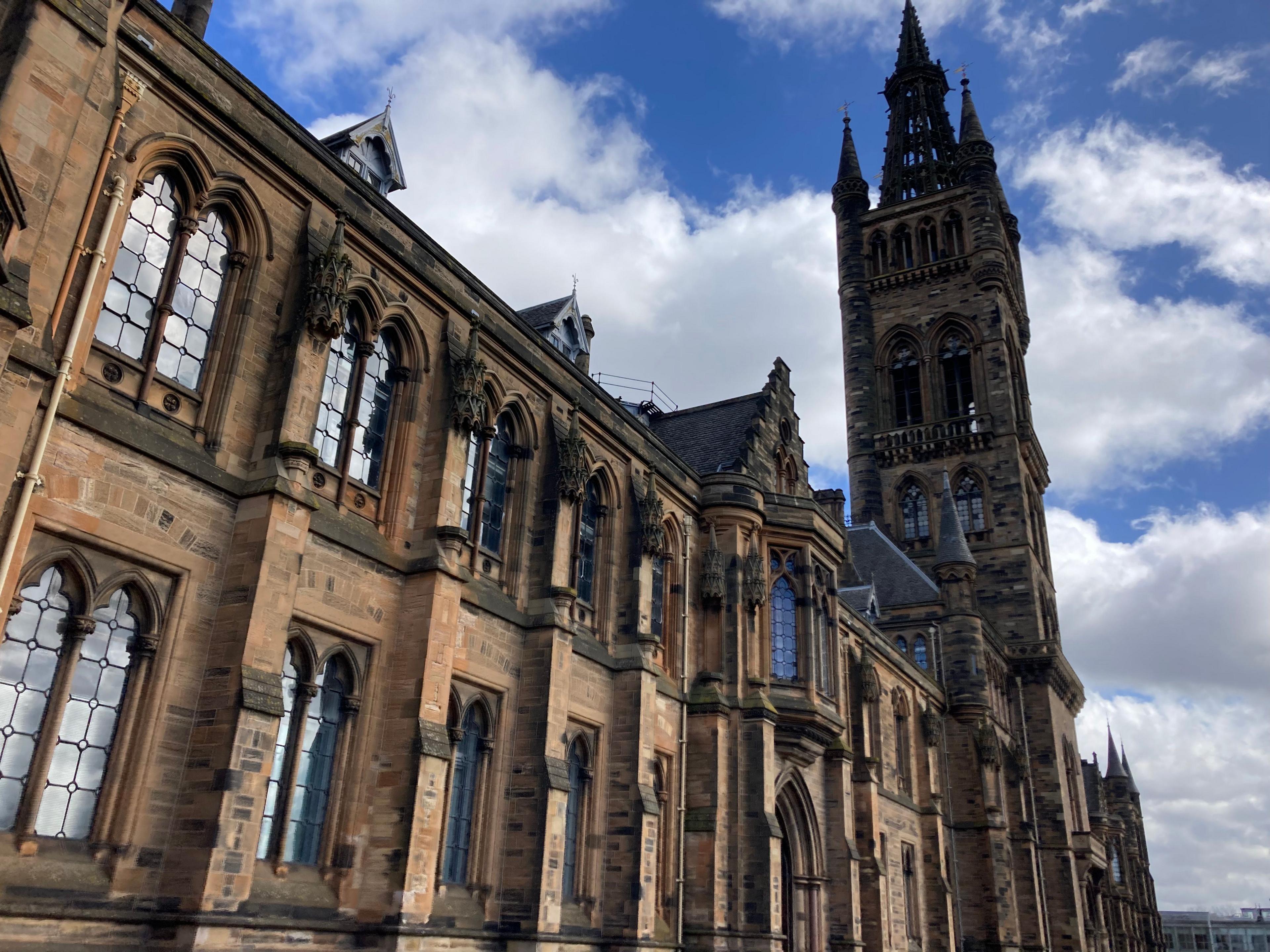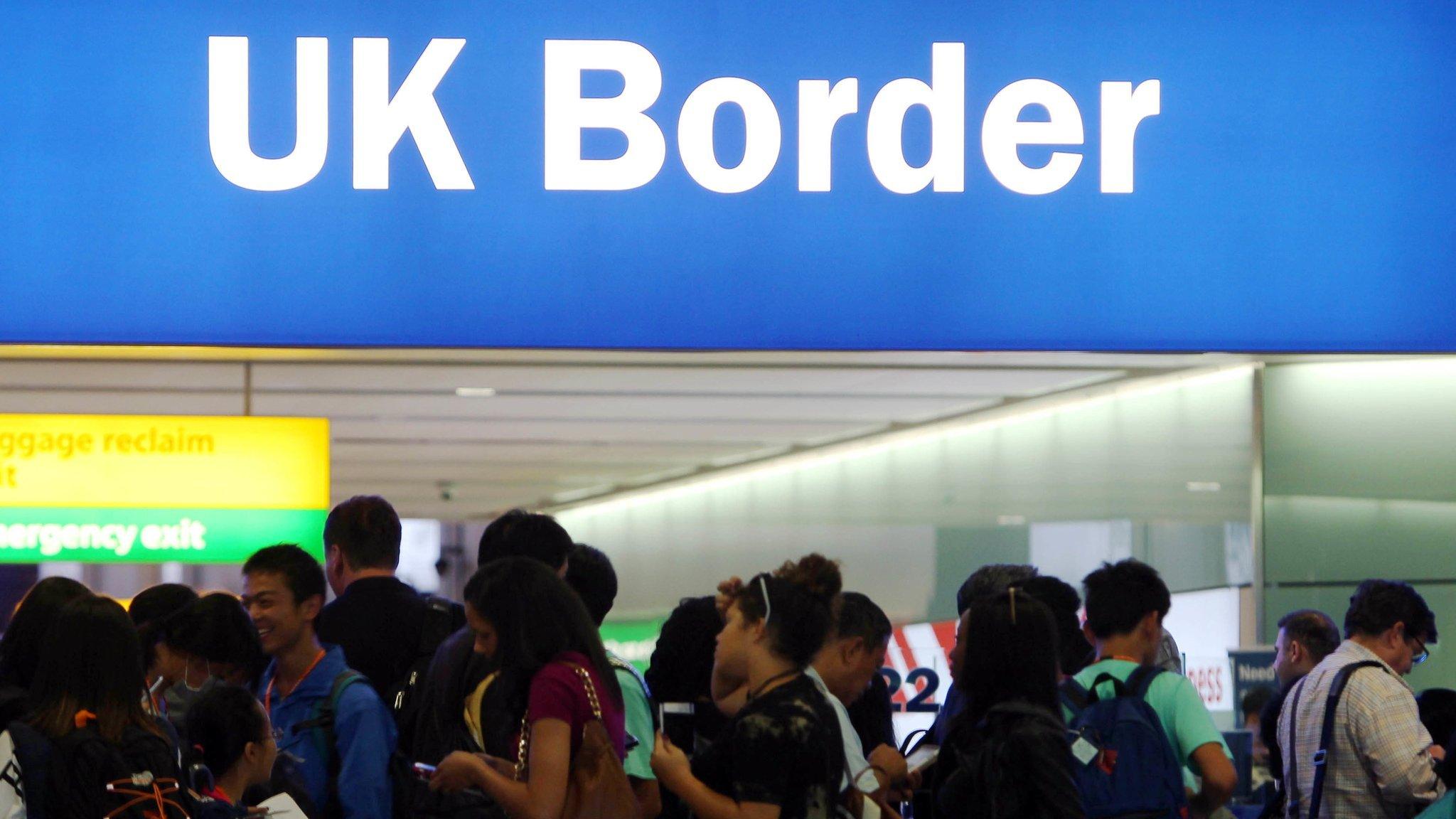Does immigration matter to the election in Scotland?

Small boats crossing the English Channel have become part of the election debate
- Published
Migration: the movement of a person across an international border or within a state, settling for more than one year - sometimes voluntary, sometimes not, by regular or irregular means.
It's a simple definition but one of the hottest political topics around the world. It probably always has been, as a vital part of the human story.
In the UK, opinion surveys suggest the salience of the issue and opposition to immigration has declined since the Brexit referendum.
But the numbers of migrants into the UK have soared since the pandemic, fuelling concerns about the effect on public services and the need for more housing.
Scottish political parties approach the issue differently, due to demographic pressures to replace working age Scots as they age. Some argue there should be a different and more welcoming approach, controlled from Holyrood.
What is 'net migration'?
The immigration count is the number of people in a year who come to the UK, intending to stay for at least a year. The emigration number covers those who leave for at least a year. Arrivals minus departers equals net migration.
It's not always that way round. Scotland's story is more often about net emigration. That only changed this century, through free movement within the European Union.
In 2019, the net UK figure was 184,000. Last year it was 685,000, according to the Office for National Statistics, slightly down from the record high of 764,000 in 2022.
The 2023 figure counted 1,218,000 arrivals, and 532,000 emigrants from the UK.
Why have numbers soared?
It's not Europeans. They're more likely to be going home. Last year, 202,000 EU citizens left the UK, while 126,000 EU citizens arrived.
Of arrivals, 1,000,031, or 85%, were from outside the European Union. Some 61,000 were British citizens, many of them coming home after being immigrants somewhere else.
Many have come in recent years from Hong Kong and Ukraine, though the number of these declined last year.

Universities bring many overseas students to Scotland
Work visas are backed by employers who cannot fill vacancies. The process is costly. A three-year skilled worker visa with health surcharge will soon cost £10,700.
Last year, the number of work visa arrivals was up from 277,000 to 423,000, almost half of them from India and Nigeria, mostly in health and social care.
The figures also include students coming to the UK to study for at least a year, up from 91,000 in 2022 to 133,000 last year. In 2022, the main non-EU sources of student recruits were India, Nigeria, China and Pakistan.
Most are required to return at the end of their courses. Some 133,000 non-EU nationals did so last year.
One area where the Conservative government has tightened rules is dependant family members. Last year, those numbers nearly doubled to 219,000.
How significant are the small boats?
Much of the attention to immigration has focussed on the small open boats that bring people to England's southern shores, many seeking asylum.
This is partly because the journey is so dangerous, costing lives as criminals profit from this human traffic. But the attention is also because it plays on fears of uncontrolled immigration.
Last year, 29,437 people arrived in the UK on "the boats" - one in 41 immigrant arrivals in the UK.
From a higher number in 2022, they made up 45% of those seeking asylum in the UK.
So they are a relatively small part of a more complex picture.
Where do immigrants go when they arrive in the UK?
London is a big magnet for new arrivals, often to stay with relatives and within settled communities.
Scotland receives around 6% of net migrants into the UK, which is lower than its 8.4% population share. Scotland may, however, have a higher proportion of those arriving on student visas.
Some 21% of the "economically active" population in England was born outside the UK, and 14% in Scotland. Half of those in Scotland were EU nationals, a higher share than other parts of the UK.
In 2020-22, nearly a quarter of NHS workers in England were not born in the UK, while in Scotland, the ratio was closer to one in nine.
Is immigration seen differently in Scotland?
Using data from 2017, attitudes in Scotland, when comparing the same survey answers in England and Wales, found similar attitudes.
In Scotland, more people believed immigration was good for the British economy than believe it is bad, by 47% to 17%. The figures for England and Wales were very close.
In Scotland, 43% of respondents to the Social Attitudes Survey thought immigration enriches British culture, and 20% thought the opposite.
The picture in England was again similar, with 43% believing immigration has a positive impact upon British culture and 23% seeing it negatively.
Last month, Migration Policy Scotland, which has a favourable view of 'well-managed migration', published its survey findings, external.
This suggested that 42% of Scots would prefer to see a reduction in immigration to Scotland, and 31% say it should be raised - reversing the position with the first such survey, published last year.
A majority - 53% - say those who come to Scotland should be given longer to remain and integrate.
In 2022, an opinion survey, external, asked which government should have control over immigration: 53% answered Holyrood and 47% said Westminster (excluding 11% ‘don’t knows’).

Health is one area which employs many immigrant workers
Could there be a different policy for Scotland?
For more than 20 years, there has been a cross-party consensus on the need to use immigration to address Scotland's demographic challenge of an ageing population and a low birth rate.
Conservatives argue that much of this could be addressed if more UK and non-UK nationals were attracted from other parts of the UK to live and work in Scotland.
That net flow is taking place this century, reversing the flows last century. In the 50 years between 1951 and 2001, it is estimated that 399,000 more people left Scotland for other parts of the UK than the other way round, while a net 474,000 Scots left the UK, external.
Since mid-2001, population flows from the rest of the UK have increased Scotland’s population by 137,000, while foreign inward migration boosted the population by 222,000.
Short of independence and control of immigration policy, the argument is made by some for control over issuing visas for people to come to Scotland, which could be on condition they do not work in other parts of the UK.
Such devolved systems operate in Australia and Canada.
What about emigration?
One way of reducing net migration is to boost the number of people leaving the country. The data is not as robust, because not all emigrants declare at passport control that they are leaving for years or for ever.
With more than half a million people leaving the UK last year, many were departing after their studies ended. The more who arrive, the more will leave, though there is the option of a graduate visa to work for up to two years in the UK.
Last year, the number of UK citizens leaving for at least a year was estimated at 98,000. That has trended down since Brexit. The end to free movement in the European Union cut down the options for living elsewhere.
What are the parties' responses?
Scottish Conservatives recognise the case for migration, but want it from the UK and would prefer it to go to the most challenged rural communities. Its UK policy seeks to deter new arrivals seeking asylum by sending some to Rwanda, and it would set targets to get net migration down.
Scottish Labour agrees with the Tories that immigration is too high, and the economy is too dependent on migrant workers. The party aims to improve training for UK nationals to close skill gaps, reform the points-based visa system and work with sectors and with the Scottish government in recognition of different needs in different parts of the country.
The SNP plan on introducing a rural visa pilot scheme, expanding the range of jobs which qualify for visas because of skill shortages, while wanting powers at Holyrood over work visas.
The Scottish Liberal Democrats are looking at lower barriers to skilled migrants and their families, while working with the Scottish government and others, "helping ensure rules are sensitive to the skills needs of every corner of the UK and every sector of the economy".
Scottish Greens argue for Holyrood control of immigration, saying there should be a more welcoming and humane approach to asylum seekers.
- Published23 June 2024

- Published25 June 2024

